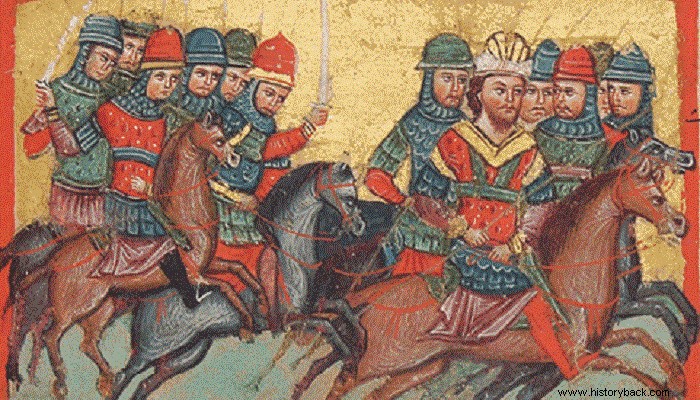
In 1251, Michael the Despotate of Epirus, influenced by the Latins, attempted to occupy Thessaloniki, breaking the treaty he had concluded with the state of the Empire of Nicaea. However, his army mutinied and joined forces with his opponents. Vatatzis, not wanting to open a new front, signed a treaty with the ruler of Epirus.
This was also the last success of John Vatatzis, who died in 1254, leaving his son, Theodoros, on the throne, who crushed the Bulgarians (in Thrace and in the straits of Kleidi), who had unnecessarily attacked in a row Greek cities in Thrace and Macedonia. He also became involved in a war with the Despotate of Epirus and captured some fortresses.
Later, a new treaty was signed between the two states, which were also linked by kinship ties. However, the despot of Epirus never actually accepted the supremacy of the Nicaean state and even went so far as to ally with the Latins. strong> In the meantime, Theodore fell seriously ill – his mental health was already disturbed. During crises that tormented him, he had threatened to kill the Great Contostavlos, general Michael Palaiologos, one of the most worthy, in terms of war, men he had by his side.
However, the situation soon became even worse for Theodore, as the despot of Epirus attacked Nicaea's possessions. Theodore then decided to send to Macedonia his best general, Michael Palaiologos, whom he pardoned and after restoring him to his position, sent him to Macedonia, but at the head of a tiny military body.
At the head of a few Macedonian soldiers, Michael Palaiologos arrived in Thessaloniki. There he joined the forces of general Michael Laskaris and together they moved towards Veria, which had been occupied by the troops of Epirus. Fatefully, the "neighbors" were quick to take advantage of the Greek dispute. Thus, a body of Serbs attacked the area around Prilapos and began to plunder it. The inexperienced local commander, Xyleas, tried with his small forces to intercept the Serbs.
Inexperienced as he was, he did not take care to first gather information about the extent of the threat, and even when he faced the Serbian horsemen, he did not manage to make his authority felt among his men. The Byzantines therefore, without guidance, rushed completely unorganized against the enemies and were fatally dispersed. In the meantime, the body of the generals, Palaiologos and Laskaris, not being able to attack the fortress of Veria, which was guarded by strong forces of Epirotes, moved towards Edessa, where they joined another small detachment, which was led by Michael Lampardas.
The despot Michael, however, was informed of the advance of the corps of Michael Palaiologos and sent against him 500 elite horsemen, led by his illegitimate son, Theodore. Lampard's men had been diverted to looting and were moving as a vanguard, completely unorganized and without any security measures. Thus, as soon as they received the surprise attack of the 500 elite Epirotians, they fled disorderly. After all, there were far fewer of them.
In all, the Nicaean army division had less than 200 men. The Emperor Theodore deliberately did not give more men to Michael Palaiologos, on the one hand because he was afraid and on the other hand because he wanted to charge him with certain defeat. Despite the surprise, Michael Paleologos was not alarmed. He gathered around 50 elite soldiers and with his lance extended charged against the opponents. But it didn't strike by chance.
He chose the opponent with the brightest chest, who was none other than the leader of the Epirotes, Theodorus. Michael deftly struck the opponent with his spear while avoiding the enemy spear. Theodore was wounded, but did not die. But not knowing his identity, one of Michael's soldiers killed him. The event terrified the Epirotes, who in turn began to flee, pursued by Michael's men.
After the battle, Michael Palaiologos and his small forces entered the city of Prilapos. From spies the despot Michael learned of her small forces and turned against the city with a powerful army and siege engines. The Epirotes launched a series of attacks against the walls, but were repulsed with losses. Michael Paleologos had won a surprising and completely unexpected victory...
